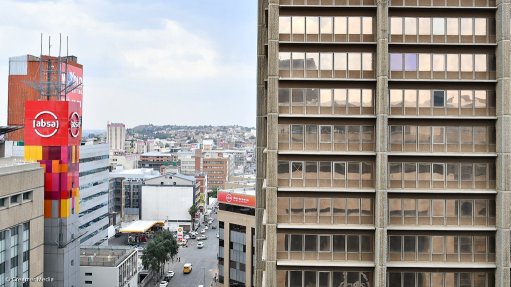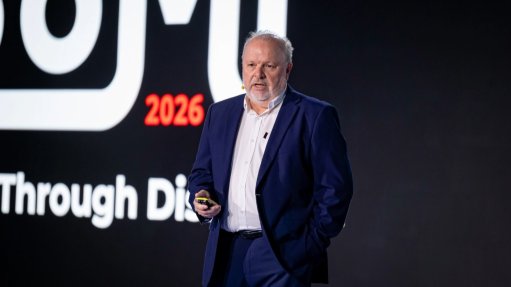Drones being used to help governments fight the Covid-19 pandemic

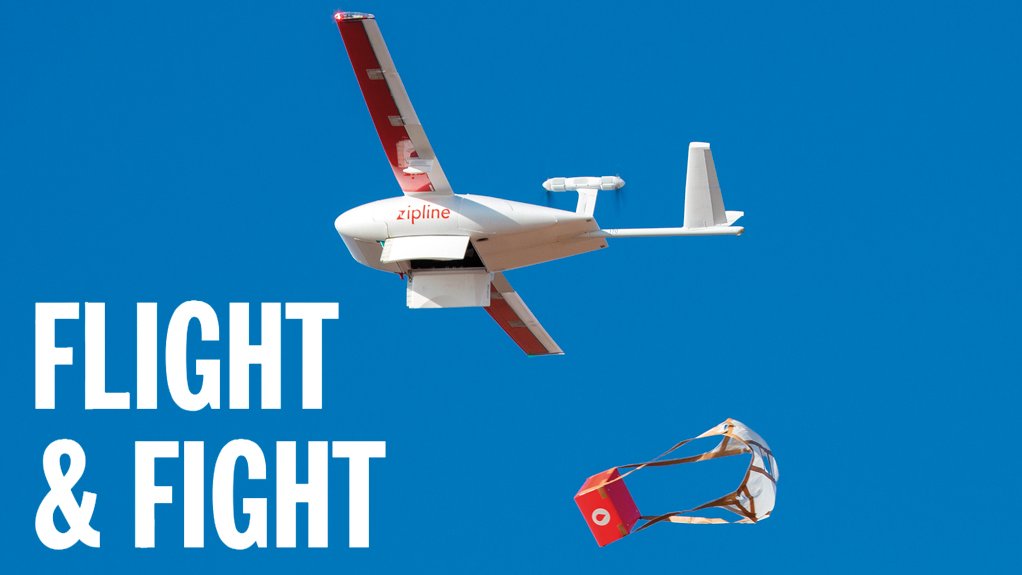
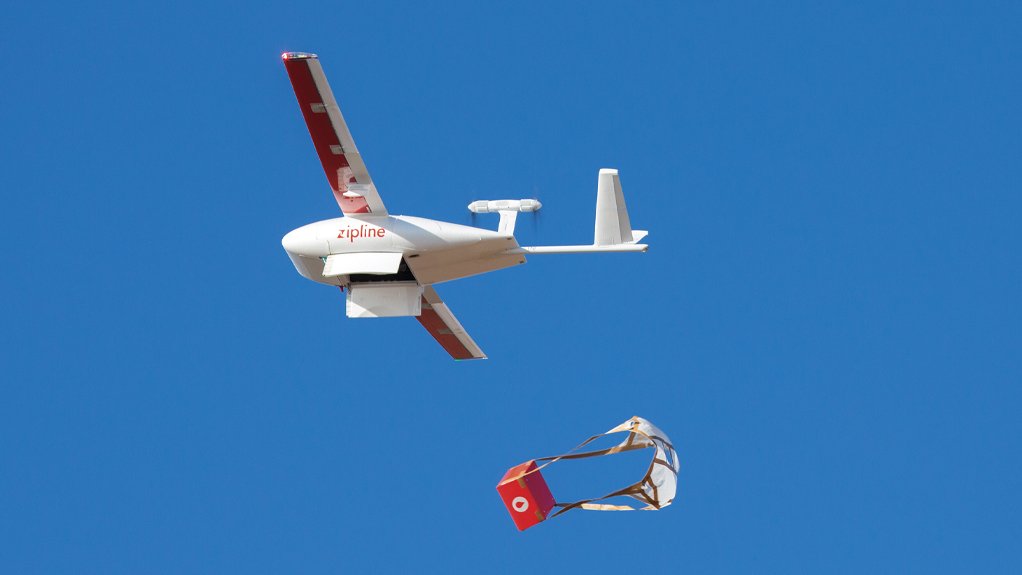
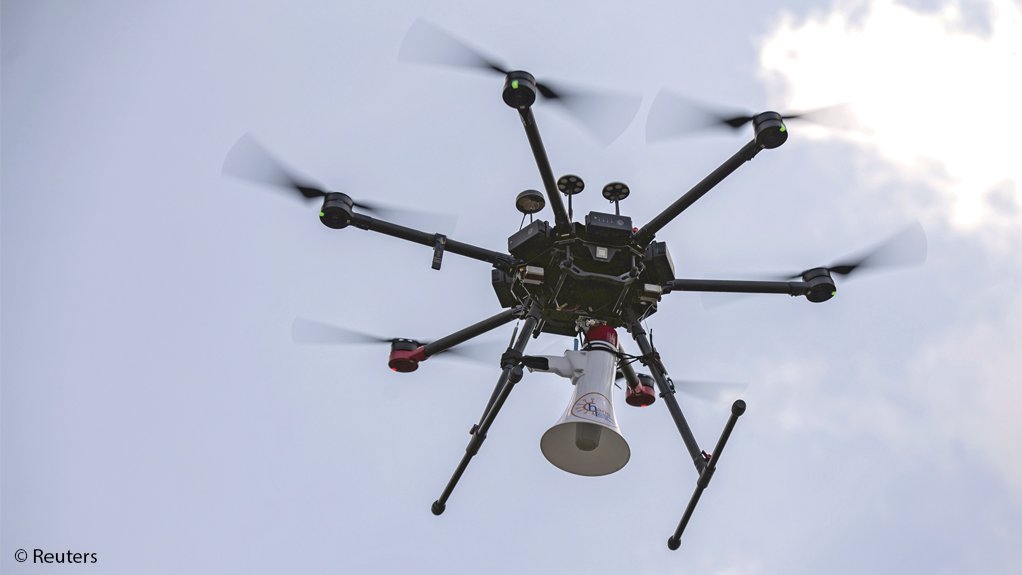
A Zipline fixed-wing drone drops a medical supply box
Authorities use a multi-rotor drone to broadcast messages through a loudspeaker in Kigali, Rwanda
Photo by Reuters
With the onset of Covid-19, technology has come to the fore, as people have been forced to work from home or increasingly remotely to ensure physical distancing, thereby increasing reliance on remote, and even autonomous, methods of conducting duties, with keen interest in the potential use of unmanned aerial vehicles (UAVs) being seen.
UAVs, or drones, are professionally referred to as remotely piloted aircraft systems (RPASes), and have, over the past few months, played an increasingly critical role amid newfound demands arising from innovative thinking to tackle Covid-19-related matters.
Most RPASes are designed to carry what those in the industry describe as ‘payload’, which usually comprises a camera. However, much of the versatility of an RPAS as a product hinges on the aircraft’s versatility and adaptability, in which its payload can be supplemented or changed entirely to carry something else.
RPAS manufacturers have seized the opportunity, with original-equipment manufacturers (OEMs) now offering advanced and never-before-seen technology solutions to meet Covid-19 response demands.
These demands are especially prevalent among health, law enforcement and fire departments, as well as search and rescue teams. Many such departments globally have been stretched to their operational limits, as an increased presence has been required to ensure that people remain safe and indoors to limit exposure to potential infection.
However, RPAS industry federation South Africa Federation of Unmanned Aviation chairperson Sam Twala tells Engineering News & Mining Weekly that the use of RPASes in South Africa for Covid-19 applications has been very limited.
To his knowledge, there has been only one case, where the South African Police Service and municipal officials from the greater Tzaneen municipality, in Limpopo, used an RPAS to monitor people’s movements and inform them, through an RPAS-mounted loudspeaker, to adhere to physical distancing and return home.
A degree of artificial intelligence was also used in this application to distinguish between targets of groups of people and vehicles.
“RPASes have a very important role to play, especially for law enforcement agencies . . . it is the intent of lockdown to limit physical interaction among people and RPASes enables law enforcement officials to limit their interaction with people,” he says.
However, the local RPAS industry, although equipped to take on Covid-19 applications, has been slow in its response and lacks industrywide cooperation, he notes.
Adapting to Changing Markets
Chinese mass-market RPAS OEM DJI – a leader in innovative RPAS technology, from technology required by hobbyist RPAS pilots to professional and commercial RPAS operators, and even major government agencies – has developed RPASes specifically for law enforcement and health agencies, as well as search and rescue operators, in response to the Covid-19 pandemic.
DJI develops and manufactures multirotor vertical take-off and landing RPAS.
Through tests with local partners, DJI highlights that RPASes can be deployed to tackle Covid-19 in four ways: by facilitating inspection and communication, disinfecting areas, delivering supplies and measuring the body temperature of individuals.
However, because some of these applications are new and unique ways of deploying RPASes, DJI states that their real impact globally is yet to be determined.
“As remotely piloted devices, RPASes are naturally effective in reducing human interactions, which is crucial when the same officers meant to safeguard communities can potentially become vectors for the virus to spread,” states DJI.
The company adds that this is not the first time that RPASes have been deployed in health-related scenarios. In Zanzibar, Tanzania, a group of researchers modified DJI’s Agras platform to spray chemicals onto rice fields to prevent malaria-carrying mosquitoes from reproducing – similar to conventional crop dusting.
In terms of inspection and communication capabilities, DJI notes that, based on evidence from global search and rescue missions, RPASes have become powerful tools to visualise expansive areas and communicate in difficult areas.
The second application, delivery of goods, has been expanded as governments encourage people to stay home, which has put increasing strain on logistics and food delivery systems.
In this regard, Twala says that using RPASes could also add significant value in terms of deliveries, especially in the medical sector, where supplies and samples require quick turnaround in different areas.
According to DJI, most large RPASes can be easily modified with a payload-drop mechanism to deliver packages of up to 6 kg. “This is particularly important in areas where . . . the virus has been confirmed, such as hospitals actively treating the virus.”
Further, DJI states that health authorities have tested ways of deploying RPASes used in agriculture to disinfect common areas more efficiently. However, while the effectiveness of this new disinfection process is yet to be rigorously measured, the speed and area that RPASes can cover are “unparalleled”, according to DJI, which highlights that spraying drones can cover 100 000 m2 in an hour using a 16 ℓ spraying tank.
RPASes can also be fitted with sensitive thermal scanners to do temperature checks, consequently reducing human-to-human interaction.
DJI’s engineering team tested different ways of calibrating airborne infrared cameras to measure body temperature. Results showed that, by installing a cotton swab within the field of view of the thermal camera, the camera can get an accurate reading, enabling inspection officers to work from a safe distance.
Servicing Africa
Another RPAS operator with a proven concept and reliable platform that is used daily in Africa is California-headquartered RPAS delivery-on-demand operator Zipline.
Zipline has a vast standardised fleet of autonomous fixed-wing RPASes, which the company has been using for several years to deliver critical medical supplies, including blood samples and products, vaccines and injectables, to health facilities in several African countries, including Rwanda and Ghana.
The RPASes descend to a safe height above the ground and drop off a box of medical products attached to a parachute at a designated spot. The RPAS can carry about 1.8 kg of cargo and reach up to 128 km/h, even in strong winds and rain.
In these countries, Zipline operates fully fledged fulfilment centres that are also used as RPAS airports, with fit-for-purpose RPAS launching and landing facilities that enable Zipline to operate in adverse weather.
These distribution centres and airports are quite similar to the systems used on navy aircraft carriers and enable Zipline to use a very small footprint of between 0.5 ha and 0.8 ha, as no runway is required.
Each distribution centre can facilitate hundreds of deliveries a day within 20 000 km2 through an 80 km return-trip service radius. A Zipline RPAS can fly up to 160 km one way.
Zipline’s system can respond to demand surges and prevent running out of stock by immediately increasing delivery volumes. This enables health systems to precisely target the distribution of more than 2 t of critical and life-saving health products every day. “If a health worker needs one mask, we can cost-effectively deliver it within minutes,” states the company.
Partnering for Purpose
Vulnerable persons global health organisation Partners In Health (PIH) and Zipline have, in Rwanda, partnered on cancer care during Covid-19, with critical cancer medications being prioritised at municipal level.
PIH and International Mission Board (IMB) executive director Dr Joel Mubiligi says patients in Rwanda come from all over the country, thereby making it a “logistics nightmare”.
He adds that during Covid-19, municipal health departments could easily help people to stock up on a few months’ worth of ordinary medicine to ensure they make fewer trips to local health facilities during the pandemic, but that cancer treatments remain an issue.
Mubiligi notes that special attention was given to patients in PIH’s and the IMB’s oncology programme during Covid-19, with Zipline deliveries of oncology medicines being prioritised as needed by treatment facilities.
Moreover, as of April 17, Zipline started delivering Covid-19 test samples of patients from more than 1 000 health facilities in the difficult-to-reach rural areas of Ghana to laboratories in the country’s capital, Accra, and its second-largest city, Kumasi.
Previously, Covid-19 test sample deliveries could take many hours to days, as a delivery truck returns to the city only when it has collected a sufficient number of samples from rural hospitals. Now, one test from a rural area can be transported for analysis in less than an hour.
In Ghana, Zipline holds all the emergency stocks of personal protective equipment, such as gloves and masks, for the facilities it serves, enabling health authorities to target distribution to regional providers when required.
Globally, Zipline launched the first emergency RPAS logistics Covid-19 operation in May with North Carolina-based nonprofit healthcare organisation Novant Health, in the US.
Twala, meanwhile, says that South Africa’s response to using RPASes to tackle Covid-19 requires that industry bands together and formulates a cooperative response. This will also enable the regulator – the Civil Aviation Authority of South Africa – to understand what the industry needs in terms of legal authority to operate during the pandemic.
Article Enquiry
Email Article
Save Article
Feedback
To advertise email advertising@creamermedia.co.za or click here
Press Office
Announcements
What's On
Subscribe to improve your user experience...
Option 1 (equivalent of R125 a month):
Receive a weekly copy of Creamer Media's Engineering News & Mining Weekly magazine
(print copy for those in South Africa and e-magazine for those outside of South Africa)
Receive daily email newsletters
Access to full search results
Access archive of magazine back copies
Access to Projects in Progress
Access to ONE Research Report of your choice in PDF format
Option 2 (equivalent of R375 a month):
All benefits from Option 1
PLUS
Access to Creamer Media's Research Channel Africa for ALL Research Reports, in PDF format, on various industrial and mining sectors
including Electricity; Water; Energy Transition; Hydrogen; Roads, Rail and Ports; Coal; Gold; Platinum; Battery Metals; etc.
Already a subscriber?
Forgotten your password?
Receive weekly copy of Creamer Media's Engineering News & Mining Weekly magazine (print copy for those in South Africa and e-magazine for those outside of South Africa)
➕
Recieve daily email newsletters
➕
Access to full search results
➕
Access archive of magazine back copies
➕
Access to Projects in Progress
➕
Access to ONE Research Report of your choice in PDF format
RESEARCH CHANNEL AFRICA
R4500 (equivalent of R375 a month)
SUBSCRIBEAll benefits from Option 1
➕
Access to Creamer Media's Research Channel Africa for ALL Research Reports on various industrial and mining sectors, in PDF format, including on:
Electricity
➕
Water
➕
Energy Transition
➕
Hydrogen
➕
Roads, Rail and Ports
➕
Coal
➕
Gold
➕
Platinum
➕
Battery Metals
➕
etc.
Receive all benefits from Option 1 or Option 2 delivered to numerous people at your company
➕
Multiple User names and Passwords for simultaneous log-ins
➕
Intranet integration access to all in your organisation













